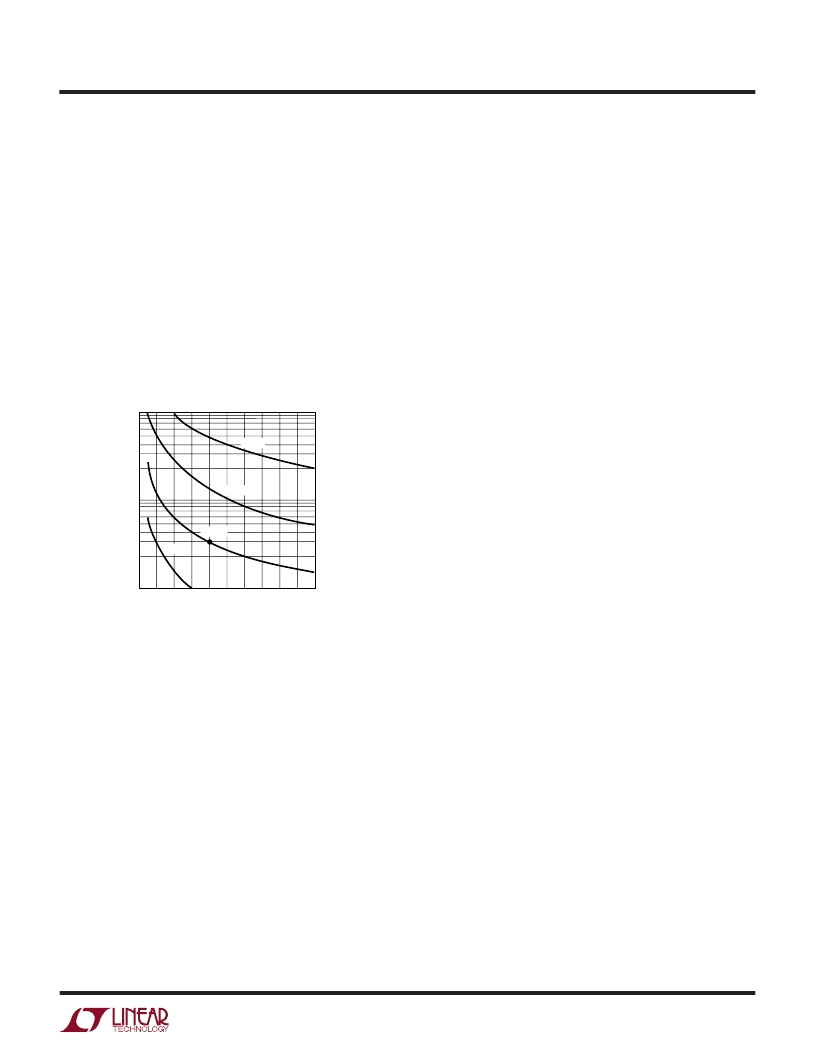- 您現(xiàn)在的位置:買賣IC網(wǎng) > PDF目錄371600 > 508570A IC PDF資料下載
參數(shù)資料
| 型號: | 508570A |
| 英文描述: | IC |
| 中文描述: | 集成電路 |
| 文件頁數(shù): | 5/8頁 |
| 文件大?。?/td> | 170K |
| 代理商: | 508570A |

LT1027
5
U
S
A
Effect of Reference Drift on System Accuracy
A large portion of the temperature drift error budget in
many systems is the system reference voltage. Figure 1
indicates the maximum temperature coefficient allowable
if the reference is to contribute no more than 0.5LSB error
to the overall system performance. The example shown is
a 12-bit system designed to operate over a temperature
range from 25
°
C to 65
°
C. Assuming the system calibra-
tion is performed at 25
°
C, the temperature span is 40
°
C.
It can be seen from the graph that the temperature coeffi-
cient of the reference must be no worse than 3ppm/
°
C if
it is to contribute less than 0.5LSB error. For this reason,
the LT1027 has been optimized for low drift.
O
PPLICATI
IU
U
to approximately 1.2
μ
V
RMS
in a 10Hz to 1kHz bandwidth.
Transient response is not affected by this capacitor. Start-
up settling time will increase to several milliseconds due
to the 7k
impedance looking into the NR pin. The
capacitor mustbe a low leakage type. Electrolytics are not
suitable for this application. Just 100nA leakage current
will result in a 150ppm error in output voltage. This pin is
the most sensitive pin on the device. For maximum protec-
tion a guard ring is recommended. The ring should be
driven from a resistive divider from V
OUT
set to 4.4V (the
open-circuit voltage on the NR pin).
Transient Response
The LT1027 has been optimized for transient response.
Settling time is under 2
μ
s when an AC-coupled 10mA load
transient is applied to the output. The LT1027 achieves
fast settling by using a class B NPN/PNP output stage.
When sinking current, the device may oscillate with ca-
pacitive loads greater than 100pF. The LT1027 is stable
with all capacitive loads when at no DC load or when
sourcing current, although for best settling time either no
output bypass capactor or a 4.7
μ
F tantalum unit is recom-
mended. An 0.1
μ
F ceramic output capacitor will maximize
output ringingand is notrecommended.
Kelvin Connections
Although the LT1027 does not have true force-sense
capability, proper hook-up can improve line loss and
ground loop problems significantly. Since the ground pin
of the LT1027 carries only 2mA, it can be used as a low-
side sense line, greatly reducing ground loop problems on
the low side of the reference. The V
OUT
pin should be close
to the load or connected via a heavy trace as the resistance
of this trace directly affects load regulation. It is important
to remember that a 1.22mV drop due to trace resistance is
equivalent to a 1LSB error in a 5V
FS
, 12-bit system.
The circuits in Figures 2 and 3 illustrate proper hook-up to
minimize errors due to ground loops and line losses.
Losses in the output lead can be further reduced by adding
a PNP boost transistor if load current is 5mA or higher. R2
can be added to further reduce current in the output sense
load.
Figure 1. Maximum Allowable Reference Drift
Trimming Output Voltage
The LT1027 has an adjustment pin for trimming output
voltage. The impedance of the V
ADJ
pin is about 20k
with
an open-circuit voltage of 2.5V. A
±
30mV guaranteed trim
range is achievable by tying the V
ADJ
pin to the wiper of a
10k potentiometer connecting between the output and
ground. Trimming output voltage does not affect the TC of
the device.
Noise Reduction
The positive input of the internal scaling amplifier is
brought out as the Noise Reduction (NR) pin. Connecting
a 1
μ
F Mylar capacitor between this pin and ground will
reduce the wideband noise of the LT1027 from 2.0
μ
V
RMS
TEMPERATURE SPAN (
°
C)
10
0
M
0
°
C
30
100
1027 AI01
1.0
10
20
100
90
80
70
60
50
40
8-BIT
10-BIT
12-BIT
14-BIT
相關(guān)PDF資料 |
PDF描述 |
|---|---|
| 508573F | Dual/Triple Ultra-Low-Voltage SOT23 µP Supervisory Circuits |
| 508576X | IC |
| 508579E | Dual/Triple Ultra-Low-Voltage SOT23 µP Supervisory Circuits |
| 508580H | IC |
| 508581F | Dual/Triple Ultra-Low-Voltage SOT23 µP Supervisory Circuits |
相關(guān)代理商/技術(shù)參數(shù) |
參數(shù)描述 |
|---|---|
| 50857363 | 制造商:WIKA INSTRUMENTS 功能描述:Sensor; IL-10 5PSI 4-20MA G1/2B 50'CBL |
| 508573F | 制造商:未知廠家 制造商全稱:未知廠家 功能描述:IC |
| 50-8575 | 制造商:Molex 功能描述:WIRE LAMP GUARD REPLACEMENTPARTFOR8575-M 制造商:Woodhead Molex 功能描述: |
| 508576X | 制造商:未知廠家 制造商全稱:未知廠家 功能描述:IC |
| 50857-7012 | 制造商:MOLEX 制造商全稱:Molex Electronics Ltd. 功能描述:Ring Tongue Terminal for 8 AWG, Closed Uninsulated Brazed Barrel, Stud Size1/4" (M6), Oxygen-Free Copper, Width 10.00mm (.394"), Length 23.50mm (.925") |
發(fā)布緊急采購,3分鐘左右您將得到回復(fù)。